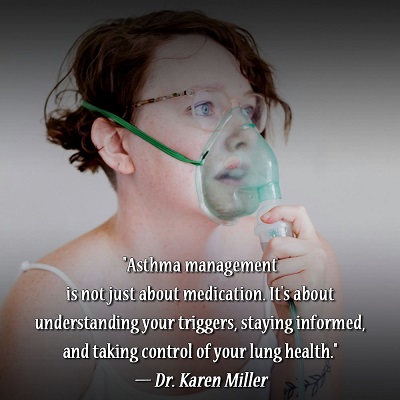 Asthma is a chronic condition that affects your lungs, causing your airways to become inflamed and narrowed, making it difficult to breathe. Imagine your airways as tiny tubes that carry air in and out of your lungs. When you have asthma, these tubes can swell and produce extra mucus, leading to symptoms like coughing, wheezing, shortness of breath, and chest tightness.
Asthma is a chronic condition that affects your lungs, causing your airways to become inflamed and narrowed, making it difficult to breathe. Imagine your airways as tiny tubes that carry air in and out of your lungs. When you have asthma, these tubes can swell and produce extra mucus, leading to symptoms like coughing, wheezing, shortness of breath, and chest tightness.
If you are worried about your lung health, asthma itself doesn’t typically cause permanent damage to the lungs, especially if you are proactive. However, frequent and severe asthma attacks over time can lead to severe inflammation and scarring of the airways, which may affect your lung function.
Asthma is caused by a combination of genetic and environmental factors, so genetically speaking, if someone in your family has asthma, you’re more likely to have it too. Other causes include respiratory infections, allergies, and some environmental factors, such as air pollution, which can also contribute to suffering from symptoms.
It’s most common among children, but many adults still have asthma. For some people, asthma is just a minor inconvenience that occurs every now and again, but for others, it can really disrupt their daily lives.
If you do have asthma you have to be careful as severe asthma attacks can be life-threatening!
Watching the Symptoms
If you are an asthma sufferer you probably know your symptoms. However, it’s good for those around you to recognize them too, just in case an asthma attack is a severe one.
Living with asthma means dealing with symptoms that can vary from one person to another. It often starts with feeling like you can’t catch your breath, as if someone’s squeezing your chest. You might notice a persistent cough, especially at night or early in the morning. You may even hear a wheezing sound when you breathe. Some days, simple activities like climbing the stairs might leave you feeling short of breath.
During an asthma attack, these symptoms can worsen suddenly, making it hard to speak or move comfortably. It’s important to recognize the early signs as a full-blown asthma attack can be dangerous!
Several factors can trigger an asthma attack including all kinds of smoke, emissions from all types of vehicles, foods with certain additives, and even some drugs such as aspirin and other nonsteroidal anti-inflammatory drugs (NSAIDs) like ibuprofen.
Respiratory infections like the flu and common cold, COVID-19, and sinus infections can also trigger asthma attacks. It’s also important to avoid situations that can lead you to a strong emotional state. For some people, this can cause hyperventilation, which can potentially trigger an attack.
Managing Asthma
Managing asthma involves finding what works best for you. Medications play a key role. You may be prescribed an inhaler for those quick relief moments and also long-term inhalers to control and prevent an asthma flare-up.
If you want to manage your asthma naturally, this involves being proactive and attentive to your body’s signals. Keeping track of your triggers such as allergens or situations that provoke symptoms, like exercise, is essential.
Maintaining a diary or journal can be incredibly helpful in identifying patterns and understanding what sets off your asthma. For instance, noting down the places you visit and the activities you engage in can pinpoint specific triggers. It may be pollen from a particular species of tree in a certain area, or a steep hill that you walk up!
Sometimes, making even the smallest of lifestyle adjustments can make a significant difference. Whether it’s reducing exposure to known allergens, adjusting your workout routine, or ensuring you have a clean, dust-free environment at home, they are all steps worth taking.
These natural approaches also complement any traditional medical treatments and help you to take control of your asthma management. Your doctor will appreciate your wanting to help yourself too!
If you can take preventative measures, the treatment side of things becomes easier. Staying on top of your symptoms with your doctor’s help, means fewer surprises and more control over your breathing, so you can keep doing what you love without asthma getting in the way.
It is important that you take the steps to manage your asthma effectively, whether that be with medications, avoiding your triggers, or changing your lifestyle.
Just make sure you seek prompt treatment if you are not sure what is going on with your lungs! You need to address your symptoms to minimize the risk of developing any long-term lung complications. By working closely you’re your healthcare providers, you can improve your lung health and quality of life, despite being diagnosed with asthma.






